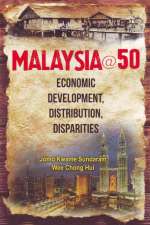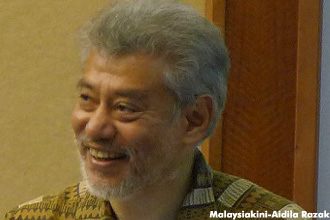by Aidila Razak@http://www.malaysiakini.com
Signing
the Trans Pacific Partnership Agreement, which is still locked in
negotiations, could sour Malaysia's relationship with its top trading
partner China, said a leading economist.
According to former United Nations Assistant Secretary-General of Economic Development Jomo Kwame Sundaram (above) , this is because the TPPA was designed to "isolate China".
"That
is the whole point of the TPPA," he told reporters after speaking at a
packed forum at Universiti Malaya last night. Not going into details of
the agreement, which Jomo (right) said he has "lots of
problems with", the economist added that TPPA involves many countries,
but is negotiated on a bilateral basis.
This, he said, provided an uneven playing field which benefit countries like the United States.
"Malaysia's
trade negotiators are not known for their negotiation acumen. What are
we trying to achieve by trying to be in the good books of the US? I'm
saying we should (have good ties with the US) and not make scurrilous
statements about them, but we shouldn't swing from one end to the other
by embracing the US and turning our backs on the other side," he said.
Jomo,
who is now Assistant Director General at the UN's Food and Agriculture
Organisation (FAO), said the TPPA was first conceived to solve a problem
which no longer existed – US trade deficit with China, which has since
closed due to US currency devaluation.
Instead
of getting involved in a "fight between the US and China", he said that
Malaysia should be more concerned with a likely US and European Union
economic alliance, which could further block Malaysia's top export -
refined palm oil.
TPPA won't guarantee free access
Pro-TPPA quarters have argued that by snubbing the agreement, Malaysia would face closed doors in member countries. Instead, they argued, Malaysia's competitors like Vietnam who may sign the TPPA, would have greater access to international markets.
Pro-TPPA quarters have argued that by snubbing the agreement, Malaysia would face closed doors in member countries. Instead, they argued, Malaysia's competitors like Vietnam who may sign the TPPA, would have greater access to international markets.
To
this, Jomo, who won the internationally coveted Wassily Leontief Prize
for Advancing Economic Frontier in 2007, said that such deals do not
really guarantee free access to markets.
"Vietnam
signed on to the World Trade Organisation and now they are no longer
allowed to breed the Mississippi catfish for the US. These deals cut
both ways. They'll find ways to protect (their market)," he said.
Jomo
spoke to reporters after launching the book 'Malaysia@50 Economic
Development, Distribution, Disparities' which he co-authored with Wee
Chong Hui.
In
his speech, he said that the book is about the "unlikely nation" of
Malaysia which had gone through half a century despite its "awkward
birth".
Boom time not result of good policy
He said that at 50, Malaysia's financial sector is squeezing out more industries like manufacturing, which spur still lacking growth fundamentals like innovation.
He said that at 50, Malaysia's financial sector is squeezing out more industries like manufacturing, which spur still lacking growth fundamentals like innovation.
 Malaysia's
rapid growth from 1985 to 1995 was less about good policy and more
because the US dollar significantly depreciated against the Japanese
Yen, he added.
Malaysia's
rapid growth from 1985 to 1995 was less about good policy and more
because the US dollar significantly depreciated against the Japanese
Yen, he added.
This
resulted in high foreign investment from North East Asian countries in
Malaysia and the region which loosely pegged its currency to the US
dollar.
The
boom time ended and finally boiled over in the 1998 financial crisis
when the Yen was allowed to depreciate against the dollar in 1995.
 He said that Malaysia's recovery effort since then has been compromised by "cronyism or 'jobs for the boys'".
He said that Malaysia's recovery effort since then has been compromised by "cronyism or 'jobs for the boys'".
"Many
people in politics say this is unsustainable but I say it is because we
have oil and we can keep turning on the oil tap," he said cynically.
"We're
depriving the future generation, but it is still not unsustainable in
the short or medium run. This is the problem. We do not have a
disciplinary mechanism," he added.
In
the book, published by SIRD Centre, Jomo and Wee discuss different
stages of Malaysia's existence, including the "three regimes of the
Mahathir era".
Retailing
at RM40, it also looks into distribution and equality over the years
across class, gender and regions, and public finances and federalism as
practiced in Malaysia.



No comments:
Post a Comment